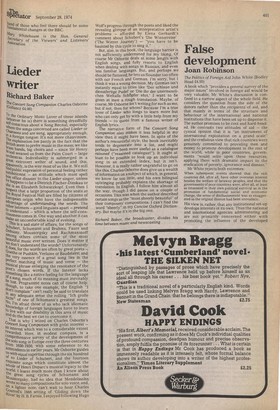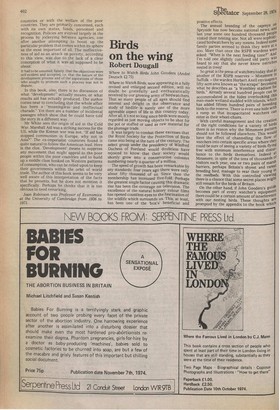False development
Joan Robinson
The Politics of Foreign Aid John White (Bodiey Head £4.50)
A book which "provides a general survey of the major issues" involved in foreign aid would be very valuable; Mr White's discussion is confined to a narrow aspect of the whole field. He considers the question from the side of the donors rather than the recipients' of aid, and that mainly in terms of the structure and behaviour of the international and national institutions that have been set up to dispense it. The author promises to be cool and hard-headed. He contrasts two attitudes of aid the cynical opinion that it is -an instrument of international exploitation on a grand scale" and the credulous view that rich countries were genuinely committed to providing men and money to promote development in the rest of the world, while in poor countries, governments "would seize upon these resources, applying them with dramatic impact to the eradication of poverty, ignorance and disease."
Mr White rejects both extremes;
When subsequent events showed that the rich countries did, after all, have other overseas interest besides the welfare of faraway peoples, and that the governments of poor countries were, after all, at least as interested in their own political survival as in the promotion of fundamental social and economic change, the sense of disillusionment was as exaggerated as the original illusion had been unrealistic.
His view is, rather, that any institutional set-up develops interests or its own. Thus the national and international agencies administering aid are not primarily concerned either with promoting the influence of the developed
countries or with the welfare of the poor countries. They are primarily concerned, each with its own status, funds, personnel and recognition. Policies are evolved largely in the process by jockeying between agencies, one after another attempting to boost up the particular problem that comes within its sphere as the most important of all. The ineffectiveness of aid as an attack on poverty, according to this view, was , due to the lack of a clear conception of what it was all supposed to be about:
ft had to be assumed, falsely, that the objectives were self-evident and accepted, i.e. that the nature of the development process and of the aspirations of those who sought to promote such a process was not in dispute.
In this book, also, there is no discussion of what "development" actually means, or what results aid has actually produced. The author comes near to concluding that the whole affair has been a "meaningless and ineffectual charade." Yet there are a number of incidental passages which show that he could have told the story in a different way.
Mr White sees the origin of aid in the Cold War. Marshall Aid was a striking success for the US, while the Korean war was not. "If aid had stopped communism in Europe, why not in Asia?" The ex-imperialist countries found it quite natural to follow the American lead. Here is the clue. 'Development' Means to suppress any movement that might appeal to the poor people within the poor countries and to build up a middle class hooked on Western patterns of consumption, who can be relied upon to keep their governments within the orbit of world trade. The author of this book seems to be very well aware of this interpretation of the facts that he presents, but he does not mention it specifically. Perhaps he thinks that it is too obvious to need remarking.
Joan Robinson was Professor of Economics at the University of Cambridge from 1956 to 1971.



































 Previous page
Previous page